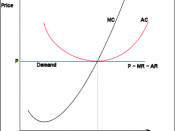What are the assumptions behind the model of a perfectly competitive industry in long-run equilibrium?
In this essay I will discuss the assumptions behind the model of a perfectly competitive industry in long-run equilibrium. The economist's model of perfect competition is highly theoretical, but is does provide a useful tool of economic analysis. In perfect competition the industry is made up of a large number of small firms, each selling homogeneous (identical) products to a great number of buyers. In competition all firms are too small to have an influence and so they will act as price takers and will charge at the equilibrium (P1):
Figure 1
A perfectly competitive market has to have homogenous products, so that if these conditions will exist, buyers will have no preference for the goods just a preference for the supplier. There must be a great amount of buyers and suppliers so that one buyer or supplier will not influence the market price.
Buyers are assumed to have perfect knowledge of what is happening on the market (the market conditions) in every part of the market. Equally do the suppliers have to be fully aware of he activities of buyers and other sellers (perfect information). The buyers cannot have any barriers to the movement from one supplier to the other. In perfect market situation there will be only one market price, which cannot be controlled in any way by any buyer or supplier. Firms are not permitted to charge different prices because this will cause their customers to go to the other companies, with the identical product, causing the producer with the higher price to loose popularity, and decreasing the amount of profit that they will receive. It then will eventually not be attractive to remain in the market for this company, as it...


